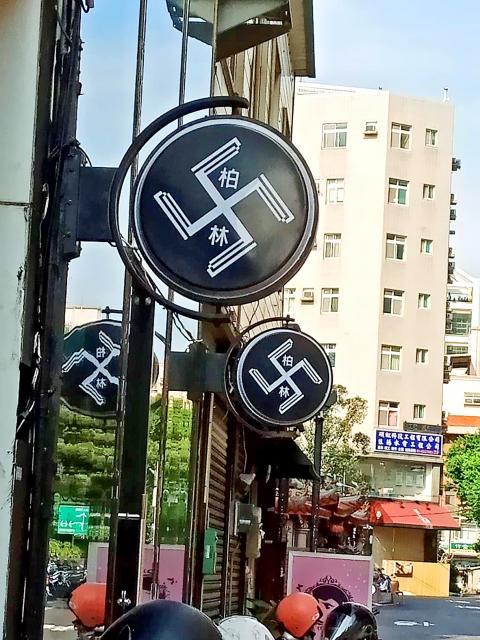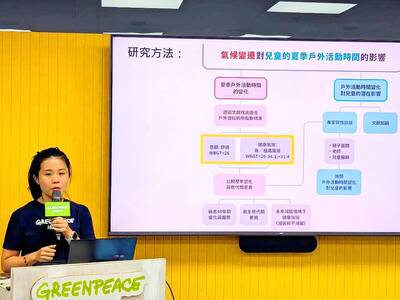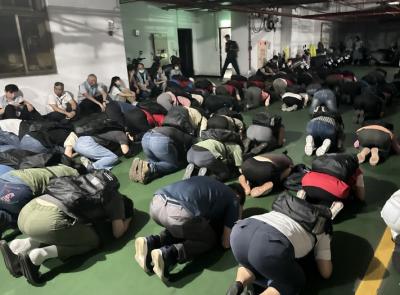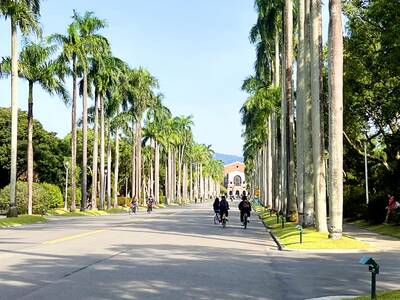The German Institute Taipei yesterday asked the owner of a salon in Hsinchu to remove signs that show razors arranged to resemble swastikas, saying that using Nazi symbols for commercial purposes is despicable.
The front entrance of the shop, called Berlin (柏林) hair salon, has two round signs on either side of the door featuring what appear to be the ancient symbol created from the arrangement of four straight razor blades.
“In regards to the hairdressing salon in Hsinchu using Nazi swastika as door signs, the German Institute Taipei states that using Nazi symbols for commercial purposes is a despicable act of offense against the victims of the Holocaust,” the institute said in a statement.

Photo: Fu Chao-piao, Taipei Times
“We call upon the owner of the shop to immediately remove those Nazi signs,” it added.
The institute said it approached the owner of the salon to ask him to change the design after receiving a complaint from a member of the public, but to no avail.
Salon owner Hsu Chen-yang (徐振洋) when asked for comment yesterday said that the design is not based on a Nazi symbol.
“How are they the same? They are completely different. It is merely a pattern formed by razors,” Hsu said.
His store does not contain any Nazi-themed decorations, he added.
He does not intend to change the signs, Hsu said, adding that they have been up for a long time.
It is not the first time the apparent use of Nazi symbols has stirred controversy in Taiwan.
In December 2016, students at Kuang Fu High School in Hsinchu paraded in Nazi-style uniforms and displayed Nazi symbols during a campus event.
In October last year, an auto parts retailer was found to have put Nazi flag stickers on shelves in the shop.
In January, the institute and the Israel Economic and Cultural Office in Taipei condemned the German Old Mark Association, an association demanding the redemption of old German mark bonds, whose members often display the Nazi flag in public.

The government should improve children’s outdoor spaces and accelerate carbon reduction programs, as the risk of heat-related injury due to high summer temperatures rises each year, Greenpeace told a news conference yesterday. Greenpeace examined summer temperatures in Taipei, New Taipei City, Taoyuan, Hsinchu City, Taichung, Tainan and Kaohsiung to determine the effects of high temperatures and climate change on children’s outdoor activities, citing data garnered by China Medical University, which defines a wet-bulb globe temperature (WBGT) of 29°C or higher as posing the risk of heat-related injury. According to the Central Weather Administration, WBGT, commonly referred to as the heat index, estimates

Taipei and other northern cities are to host air-raid drills from 1:30pm to 2pm tomorrow as part of urban resilience drills held alongside the Han Kuang exercises, Taiwan’s largest annual military exercises. Taipei, New Taipei City, Keelung, Taoyuan, Yilan County, Hsinchu City and Hsinchu County are to hold the annual Wanan air defense exercise tomorrow, following similar drills held in central and southern Taiwan yesterday and today respectively. The Taipei Mass Rapid Transit (MRT) and Maokong Gondola are to run as usual, although stations and passenger parking lots would have an “entry only, no exit” policy once air raid sirens sound, Taipei

Taipei placed 14th in the Quacquarelli Symonds (QS) Best Student Cities 2026 list, its highest ever, according to results released yesterday. With an overall score of 89.1, the city climbed 12 places from the previous year, surpassing its previous best ranking of 17th in 2019. Taipei is “one of Asia’s leading higher-education hubs,” with strong employer activity scores and students “enjoying their experience of the city and often keen to stay after graduation,” a QS staff writer said. In addition to Taipei, Hsinchu (71st), Tainan (92nd), Taichung (113th) and Taoyuan (130th) also made QS’ list of the top 150 student cities. Hsinchu showed the

Environmental groups yesterday filed an appeal with the Executive Yuan, seeking to revoke the environmental impact assessment (EIA) conditionally approved in February for the Hsieh-ho Power Plant’s planned fourth liquefied natural gas (LNG) receiving station off the coast of Keelung. The appeal was filed jointly by the Protect Waimushan Seashore Action Group, the Wild at Heart Legal Defense Association and the Keelung City Taiwan Head Cultural Association, which together held a news conference outside the Executive Yuan in Taipei. Explaining the reasons for the appeal, Wang Hsing-chih (王醒之) of the Protect Waimushan Seashore Action Group said that the EIA failed to address